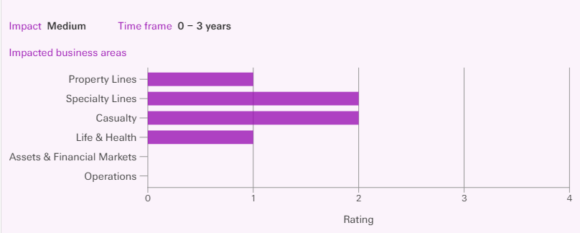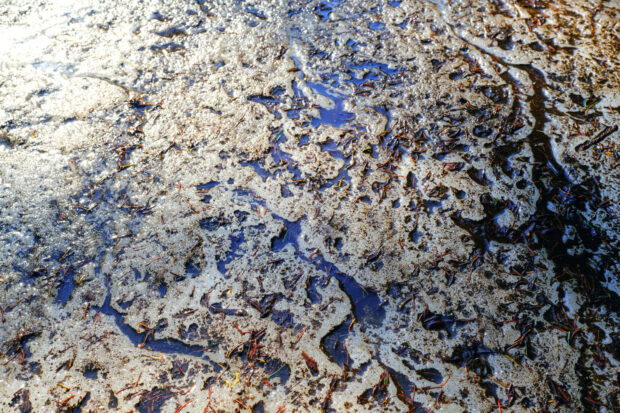Climate change is the cause of a key emerging risk identified by Swiss Re’s SONAR report, which is leading to the opening of previously frozen waterways in the Arctic and the creation of new shipping and trade routes.
The economic and strategic potential of the region is coinciding with the potential for environmental exposure and geopolitical frictions, raising concerns about how economic activities and related risks will be controlled in the region, indicated the report published this month, titled Swiss Re SONAR – New emerging risk insights.”
The SONAR report explained that the Arctic region is warming two to three times faster than the rest of the globe — which is driving this “Arctic opening.”
“The concurrent increases in economic interests, environmental change and geopolitical tensions make the Arctic a hotbed for emerging risks and potential risk accumulation,” according to Patrick Raaflaub, Swiss Re’s Group Chief Risk Officer, in a statement accompanying the report.

The report discussed the potential impacts of these climate-related changes in the Arctic:
- Demand for insurance related to economic activities in the Arctic region – ranging from marine trade, to fishing, to mining, oil and gas drilling and tourism – is likely to grow.
- Arctic opening and permafrost melt give rise to environmental risks, which could impact property and specialty lines of business. Pollution could trigger casualty insurance policies. (Rising temperatures are releasing methane and other greenhouse gases, which further accelerates global warming, the report said.)
- Economic and geopolitical uncertainties bring strategic and reputational risks.
- Potential for business disruptions in the region, and also for secondary effects on global supply chains is elevated.
- The release and migration of pathogens formerly frozen in ice and permafrost could be the source of new epidemics/pandemics.
- Cooperation among the eight member states of the Arctic Council has been suspended, fostering governance, regulatory and legal uncertainties. These will impact also the regulatory framework for insureds and insurers. (The council’s member states are: Canada, Denmark, Finland, Iceland, Norway, Sweden, Russia and the U.S. After Russia’s invasion of Ukraine, the other seven member states declared a joint suspension of collaboration with Russia in the council, the report explained.)
- The prospect of military conflict in the region has increased, changing the risk landscape for entities active in the region and their insurers. (The report noted that Russia sees Arctic ice melting as a defense threat.)
“Melting sea ice covers and permafrost threaten the foundations of buildings in the region, and livelihoods. Arctic populations are seeing their sources of marine and wild food disappearing, and their homes being destroyed,” the report continued.
“The risk profile of many activities in the region will change as temperatures continue to rise. Among the effects are sea-level rise, which threatens settlements and industrial installations. Also, toxic waste deposited in prior decades in the course of military, mining and other adventures can be uncovered and dispersed, leading to environmental pollution,” it said. “And, melting ice and thawing permafrost may result in release of infectious pathogens, new sources of potential epidemics and pandemics. Other threats are wildfires and heatwaves, and their effect on soil quality and nutrients. These also change the composition of the Arctic forests, which could render the latter less resilient.”
The trend of increasing environmental and economic risk is paired with the strategic interests and military ambitions of the eight nations with coasts on the Arctic sea – the members of the Arctic Council, the SONAR report added.
Many nations have a military presence and infrastructures in the region, and some are ramping up their capabilities, “with Russia’s invasion of Ukraine having raised the risk of conflict in the region,” the report said, noting that these tensions coincide with NATO’s admission of Finland in April 2023 and Sweden’s pending application.
Source: Swiss Re’s SONAR
Related:





















 The Future of HR Is AI
The Future of HR Is AI  AI Got Beat by Traditional Models in Forecasting NYC’s Blizzard
AI Got Beat by Traditional Models in Forecasting NYC’s Blizzard  Teens’ First Year on the Road Most Deadly
Teens’ First Year on the Road Most Deadly  High Court Ruling on Trump Tariffs to ‘Ease Uncertainty,’ Says AM Best
High Court Ruling on Trump Tariffs to ‘Ease Uncertainty,’ Says AM Best 